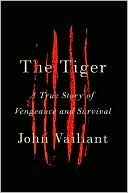More on this book
Community
Kindle Notes & Highlights
“The general appearance of the tiger is that of a huge physical force and quiet confidence, combined with a rather heavy grace.”
Callous government is more ravenous than tigers.”
when you’re broke and disconnected and living in the woods, the steady pronouncements of clocks and calendars no longer carry the same weight.
“The taiga is my home,” he said. “When I come back to my house, I feel like a guest. That’s how most hunters feel.
“The most terrifying and important test for a human being is to be in absolute isolation,” he explained. “A human being is a very social creature, and ninety percent of what he does is done only because other people are watching. Alone, with no witnesses, he starts to learn about himself—who is he really?
“Once you have passed the solitude test,” continued Solkin, “you have absolute confidence in yourself, and there is nothing that can break you afterward.
Many people reach a point where they realize that the shape their life has taken does not square with the ambitions they once had for it.
How with this rage shall beauty hold a plea? SHAKESPEARE, Sonnet 65
I have a subconscious feeling that if I have not hurt a tiger, he will not be aggressive toward me.”
“the tiger is such an unusual animal: very powerful, very smart, and very vengeful.”
Uexküll is considered one of the fathers of ethology, which is also known as behavioral ecology. It is a young discipline whose goal is to study behavior and social organization through a biological lens. “To do so,” wrote Uexküll in “A Stroll Through the Worlds of Animals and Men,” “we must first blow, in fancy, a soap bubble around each creature to represent its own world, filled with the perceptions which it alone knows. When we ourselves then step into one of these bubbles, the familiar … is transformed.”
“These different worlds,” wrote Uexküll in 1934, “which are as manifold as the animals themselves, present to all nature lovers new lands of such wealth and beauty that a walk through them is well worth while, even though they unfold not to the physical but only to the spiritual eye.”
As the science writer Stephen Budiansky wrote in If a Lion Could Talk, “we have no means of describing cognitive processes that do not involve words.” Ultimately, the problem comes down to umwelt; we are such prisoners of our subjective experience that it is only by force of will and imagination that we are able to take leave of it at all and consider the experience and essence of another creature—or even another person.
In order to succeed, predators must actively—and consciously—contrive successful hunting scenarios by adapting to, and manipulating, random events within a constantly shifting environment. This, as any hunter or businessperson knows, is hard to do, and these conditions favor the prey almost every time.
“Perhaps,” speculated Martin, “this was the origin of mythology … in which human beings and animals mingle and merge into each other.”§
When we look at nature, we are only looking at the survivors.
Barrett believes their innate grasp of these primordial relationships is a genetic legacy based on millions of years of hard-won experience, and that this is why young children continue to be fascinated by dinosaurs and other monstrous creatures. He calls this “Jurassic Park syndrome”; the implication is that, in ages past, this was information one absolutely had to take an interest in if one was to survive to breeding age.
Evidence suggests that the reason tigers and their kind continue to capture our attention is because, over time, this has proven the most effective way to prevent them from capturing us.
an experience so aberrant and alien to us, and yet strangely, deeply familiar: there is a part of us that still needs to know.
To end a person’s life is one thing; to eradicate him from the face of the earth is another.
The one certainty in tiger tracks is: follow them long enough and you will eventually arrive at a tiger, unless the tiger arrives at you first.
After wounding her, the inspectors tracked her, only to find she had doubled back and set up an ambush. This is where they found her, poised to attack, covered in a light dusting of snow. She had died waiting for them.
Mountains are the more beautiful After the sun has gone down And it is Twilight. Boy, Watch out for tigers, now. Let’s not Wander about in the field. YUN SŎN-DO (1587–1671), “Sunset”
If you’re afraid of the wolf, stay out of the forest. Russian Proverb
To say that a tiger is an “outside” animal is an understatement that is best appreciated when a tiger is inside.
Summoning a Russian proverb, he added, “Hope dies last.”
“For tigers to exist, we have to want them to exist.”


